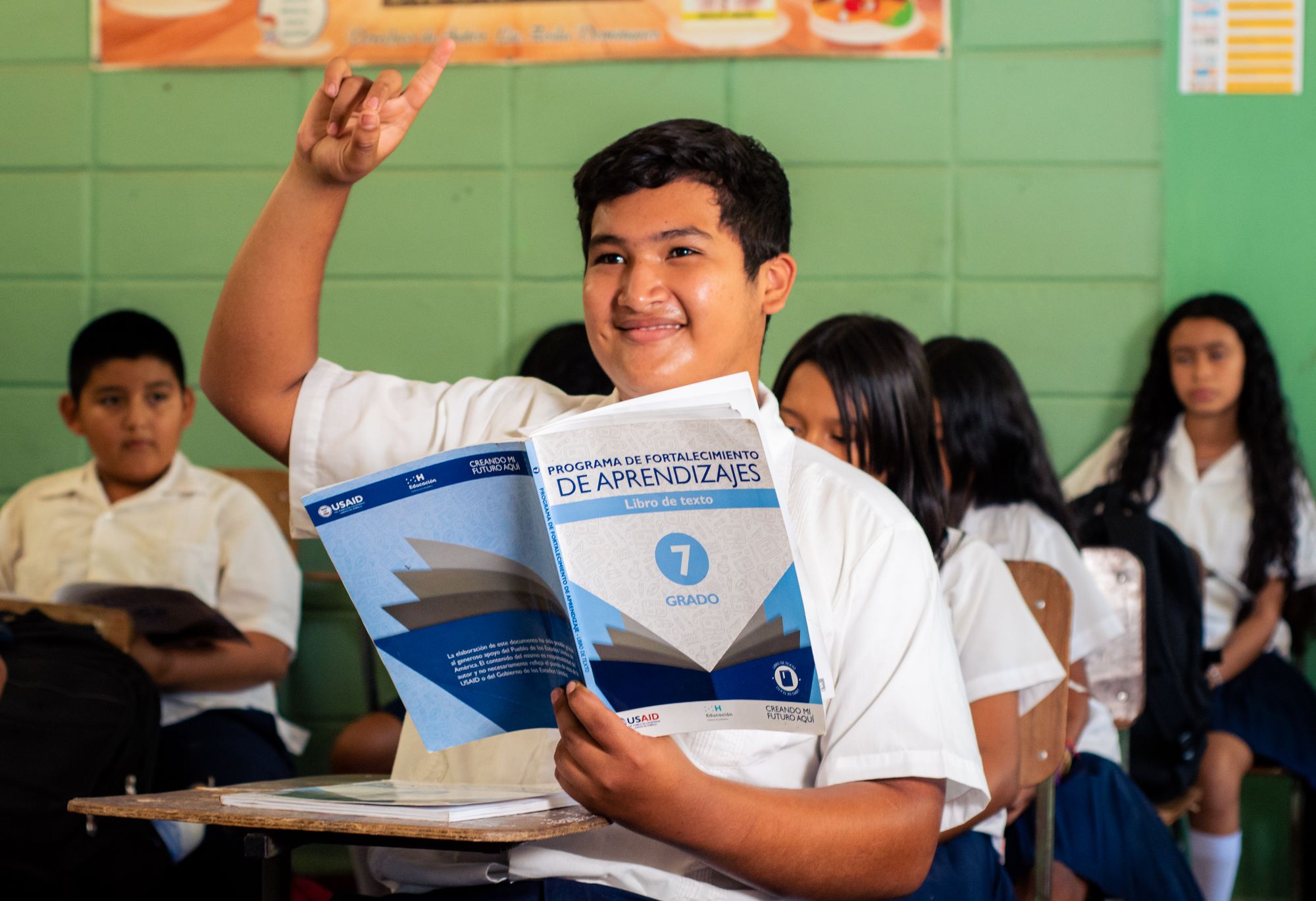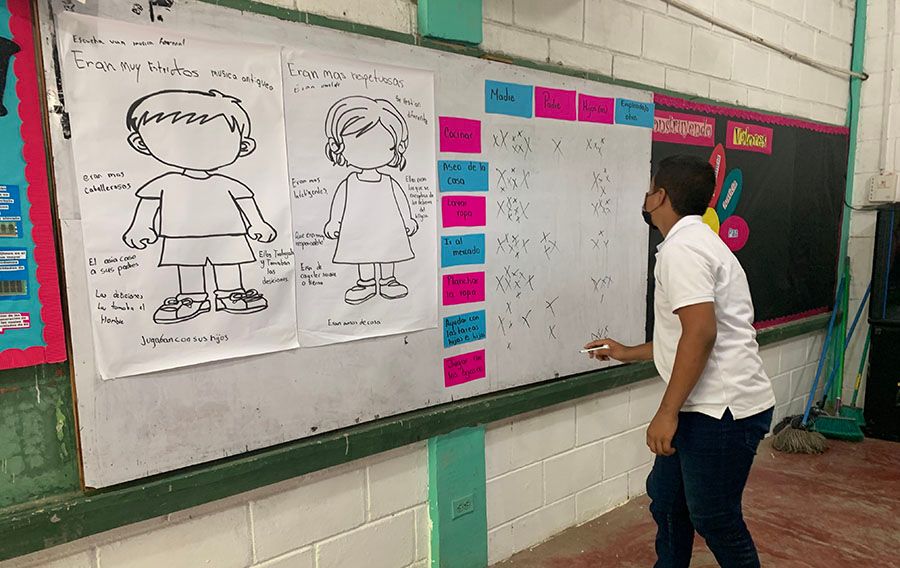With 16- to 29-year-olds making up a quarter of El Salvador’s population, young people have the potential to play a transformative role in the country’s labor market and contribute to economic prosperity in this Central American country, where economic growth has exceeded 3 percent only twice this century. Yet many young Salvadorans—confronted by gang coercion, a limited job market, and pressures to undertake costly and dangerous migration—face difficult life choices.
To give young Salvadorans positive options for supporting themselves and their families, within their home country, the U.S. Agency for International Development (USAID) launched the Bridges to Employment project in 2015. The idea was to increase and improve employment opportunities for vulnerable youth, including young parents, people with disabilities, returned migrants, and the lesbian, gay, bisexual, transgender, and intersex (LGBTI) community—with a focus on El Salvador’s highest-crime municipalities.

“When vulnerable young people have access to high-quality, comprehensive, and market-relevant services that maximize their strengths, they are more likely to improve their employability and income, and less likely to migrate,” said Caterina Valero, the Chief of Party for the project.
When the Bridges team hit the ground in 2015, we found an atmosphere of distrust between companies and vulnerable young people. Employers found it difficult to see past unfavorable stereotypes and were largely unwilling to hire young people, especially those from high-risk neighborhoods. The hiring processes are rigorous, time-consuming, and expensive, often requiring applicants to take practical and psychometric tests and pay for invasive medical exams; they also entail police record checks for each new application, making the job search process a frustrating one for young people.
We tackled this challenge from various angles, collaborating with stakeholders across El Salvador’s workforce development (WFD) system, including the Government of El Salvador, training centers, businesses, and civil society organizations. Working all sides of the problem, we aimed to ensure that young people are better prepared with the technical and life skills they need to succeed in the formal labor market, and that the labor market was more receptive to them.

Workforce Development and Employment
Economic opportunities—or a lack thereof—play a key role in shaping the day-to-day lives of young people in El Salvador as well as determining their life choices. While most young people are eager to support themselves and their families, they often feel that given the weak economy, the perception among employers that young people lack skills, and the ever-present threat posed by gangs, there is little chance for them to succeed in their home country.
Bridges was designed to help vulnerable young people gain the skills, confidence, and opportunities they need to get their start in El Salvador’s highest-growth sectors, such as manufacturing, commerce, and IT, thereby mitigating their economic motivation to migrate.
Bridges reduced systemic barriers to youth employment, including legal hurdles and discriminatory workplace policies and practices. Its key efforts included 1) improving support for young people through municipal and national policies, 2) conducting a communications campaign to improve public and employer perceptions of young people, and 3) supporting companies in improving inclusion of vulnerable young people in the workforce.
One of the key strategies for strengthening economic opportunities, training, and assistance available to vulnerable young people over the long term was collaborating with national and local governments to enshrine this support in public laws and policies. Some of these new policies include:
- Creating municipal youth policies in Ciudad Delgado, Mejicanos, Santa Ana, San Pedro Nonualco, San Salvador, Soyapango, and Zacatecoluca—which strengthened the legal framework for the protection, participation, and development of young people in these high-crime communities.
- Supporting El Salvador’s National Youth Institute to develop a new institutional policy to bolster the assistance it provides to young people with disabilities, including its staff members with disabilities.
- Developing a guide to assist individuals with disabilities and employers in navigating the government’s process for certifying a person as having disabilities.
Our team’s nationwide public communications campaign—using traditional and social media—sought to improve the perceptions that employers and the Salvadoran public have of returned migrants, people living in areas with high rates of violence, disabled young people, young parents, and young people who identify as LGBTI. Employers of project-trained young people, such as the CEO of the plastics manufacturing company Termoencogibles, served as vocal advocates, sharing their perspectives on how employing young people is in a company’s self-interest. Lastly, Bridges helped 56 firms make their corporate policies more inclusive of vulnerable young people and other marginalized populations.
![Bridges to Employment-03[1].jpg](https://dai-assets.s3.amazonaws.com/blogs/Bridges%20to%20Employment-03%5B1%5D.jpg)
Bringing in the Private Sector
Assessing the baseline situation in 2015, our team found a massive 60 percent unemployment rate among young people in the project’s targeted areas and training centers were ill prepared to help. “Many young women and men want to work, but because the education curricula provided by educational institutions are outdated, young people don’t gain the necessary skills demanded by employers,” said Valero.
We set about working with private sector firms to uncover their specific needs before building the capacity of the training centers—focusing heavily on high-growth sectors such as manufacturing, IT, commerce and tourism, energy, and agroindustry. After five years, 19 new and three updated training curricula received certification and two training organizations received accreditation to offer courses through the Salvadoran Institute of Professional Development (INSAFORP). A total of 11,930 vulnerable young people have completed training, gaining the skills and abilities demanded by employers.

Photo courtesy USAID Bridges.
“In my country, when you are young and do not have work experience, it is extremely difficult to get a job,” said Rafael Mendoza, a young man from Sonzacate. “USAID [Bridges] supported me, providing a positive team, great teachers, quality education, and the inspiration I needed to realize that it is possible to get a job and support a family.”
Working as matchmaker, Bridges cemented more than 100 alliances between these training centers and private firms, establishing relationships that can carry on into the future.
.png)
Engaging Elusive Young People
Our guiding vision was to position Salvadoran young people as valued, sought-after members of the national workforce, capable of critically evaluating their training and employment options and proactively pursuing job opportunities in high-growth sectors receptive to skilled recruits.
The team sought to boost access to information, training, tools, and other support services so young people can proactively seek to better their own futures. Bridges produced a variety of valuable resources, such as the Psychosocial Assistance Toolkit, career orientation guides, labor orientation videos, and the Entrepreneur Assistance Model & Toolbox, which will be available to young people through the project-created resource centers, as well as through government agencies, training centers, and civil society groups.
Aware that young women in El Salvador face distinct barriers to employment, Bridges knew they needed tailored outreach. In the past, too many courses and job opportunities have been defined by traditional gender roles. The project helped employers adopt more equitable and inclusive hiring practices and worked with training centers to update their curricula.
Through a flexible education program certified by the Ministry of Education, Science, and Technology, Bridges supported training centers in assisting 338 young women who had dropped out of school to complete their high school education at an accelerated rate. By ensuring that the young women have the education required by employers and the life skills necessary to succeed, the project not only broadened the opportunities available to young women in El Salvador but empowered them to chart their own personal and professional paths.
Bridges also helped women break barriers that had previously led to a gendered workforce. “In the past, we thought furniture assembler positions could only be filled by men with solid experience. Now, we have broken paradigms by hiring women for traditionally male-dominated jobs, recognizing that a person’s gender does not determine their skills or abilities. We are convinced that with a little training, young women can perform as well as someone with extensive experience,” said the hiring manager of Grupo Unicomer.

Photo courtesy USAID Bridges.
In another example, Bridges worked with a training center to open doors for qualified young women to enter El Salvador’s growing plastics industry: 76 young women from the country’s highest-crime communities completed technical and life skills training and gained hands-on experience operating state-of-the-art equipment. They have since taken jobs with a variety of plastics manufacturers as technical operators of flexographic printing machines, film extrusion machines, and injection and blow molding machines, among other positions.
The flexible education program helped more than 600 young people who had previously dropped out of school finish their studies and graduate. Through the project’s assistance, 11,930 vulnerable young people completed training programs, equipping them to meet the demands of employers in growing sectors. Helping young people navigate the complexities of the job search process, holding mock interviews, and offering resume feedback resulted in 4,708 of them getting a new or better job. More than 1,200 companies hired young people trained by Bridges.
Ongoing collaboration between the private sector, government actors, and training centers will play a key role in determining the effectiveness of El Salvador’s workforce development system for years to come, but the long-term sustainability of the alliances will ultimately depend on the will of all these key players to continue collaborating and contributing to a virtuous circle of feedback and reliance on one another. The Bridges project laid a solid foundation to facilitate ongoing cooperation; the onus now lies with those who have the most at stake to continue seeing the tremendous value El Salvador’s young people have to offer their country.
Lessons Learned
- Partnership and joint implementation with trusted, knowledgeable local institutions are must-haves.
- A systemic approach—working with a broad range of stakeholders to address specific gaps and improve coordination within the workforce development system—is key.
- Life skills training—covering self-esteem, communications, and critical thinking—is an essential part of personal and professional development programs for young people.
- Be open to providing stipends so young people can participate in training—many do not have even the minimal resources needed to attend courses or pay for a meal during the day.
- Career guidance, job placement, and other support services are integral to workforce training programs—upgrading technical skills alone will likely be insufficient.
- Reach young people where they are, which is typically on social media.
- To ensure young people are committed to obtaining a job set clear expectations with them at the recruitment stage and obtain their commitments to take specific actions to pursue employment.
Leanne Webster was Deputy Chief of Party for DAI-led Bridges to Employment.



